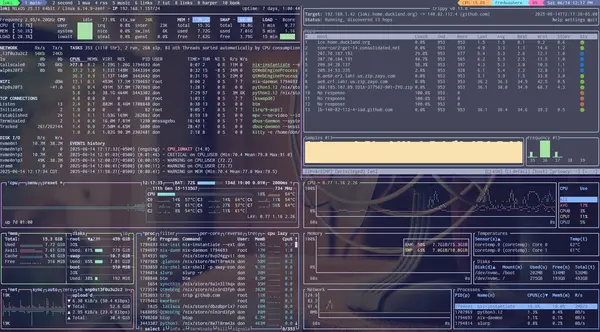Well, aside from the burst of posts, it as been a spell since I last posted
something. Sorry about that.
Well, I think my little ‘Challenge with NixOS’ which I started way back in
January 2023 has been passed. I have one local server, one local ‘appliance’, and one VPS not on NixOS. Everything
else has been converted for a while. Keeping my laptops’ config synced turned out to be a good thing. My main
laptop ate its drive just before work one morning, I was able to grab the pixelbook and
start working as it was fully configured, and the needed data was synced in place. Nice.
Speaking of pixelbooks, I picked up a ’new’ 2017 PixelBook. This one is the i7 with a nvme drive and a battery in great
shape. I can take it to the office and never have to plug it in using it for my video calls and music player.
Still at the same job I started back November 2016. Yikes. I will try to update this more with more technical stuff, I
hope.
Oh, I changed the theme because the old one had not been updated in a long time, and I was getting tired of the security
notifications.
Today’s task was around system monitoring which is something I have used before as I do not have any GUI system
monitoring apps installed.
 clockwise, top left: glances,
trippy, bottom,
btop
clockwise, top left: glances,
trippy, bottom,
btop
Most of the time, when you laptop/server is running great, you do not worry about what is running or how much CPU/RAM is
being consumed. But, then you notice that program start-up seemed awfully slow or that remote site was a bit slow or
did not respond at all. What now? Monitoring tools to the rescue!
I just found this tool recently. It gives a great overview of not just what process are running, but how your network
interfaces are doing, disk i/o as well as filesystem usage, and an overview of the IRQ in use. Truly, your system at a
glance. The only metric it is missing for me is temperature of the CPU and drives.
Trippy is another new find for me. It is traceroute, but all TUI up. It is easy to read, has a stop-light icon on the
far right to let you know the status of each hop. Nice.
Bottom is another system resource monitor, but instead of just columns of numbers, you get a real-time chart of CPU,
RAM, and network usage, along with an overview of system tempatures, disk usage (but not disk I/O), and a process
overview. This is a great tool to leave up running while you are trying to track down some issue as you can see the
historical trends.
btop is my go-to top replacement. I even have a bash alias for top calling btop: alias top=btop and a key sequence
for my tmux config to call it up: bind '~' split-window "exec btop". btop shows the same types of information as
bottom, but goes into more details. Disk display, for example, has not just space used but disk I/O as well. It
offers a lot of configuration options. For example, in the above picture, it is using the catppuccin_mocha theme to
match the rest of my desktop, both GUI and TUI apps. Nice.
The challenge today was to use the tools at least twice and note an observation. In the above picture, I was just
starting a NixOS update and rebuild, so you can see the CPU, RAM, and network starting to get used more.
Yesterday left me with 155 points. Today’s basic challenge was worth 10 points,
with a bonus of 5 points for customizing the display of the tool (btop’s theme). I did not do the other bonus of
scripting alerts as I already have another system for that. So, 15 points today, brings the total to 170.
There is a bonus 30 points up for grabs if I use a terminal multiplexer. As seen in the picture above, that is tmux
with the first pane split into four to show the tools off, but I also have panes for my email, RSS reader, mastodon
client, and ssh shells on a couple other machines.
And for added geek points:
[don@loki:~] $ tmux list-sessions
chat: 2 windows (created Sat Jun 14 22:34:14 2025)
duckland: 3 windows (created Sat Jun 14 22:44:28 2025) (attached)
loki: 5 windows (created Sat Jun 14 22:29:16 2025)
nixos: 2 windows (created Sat Jun 14 22:29:49 2025)
Which brings my grand total to 200!
 clockwise, top left:
clockwise, top left: